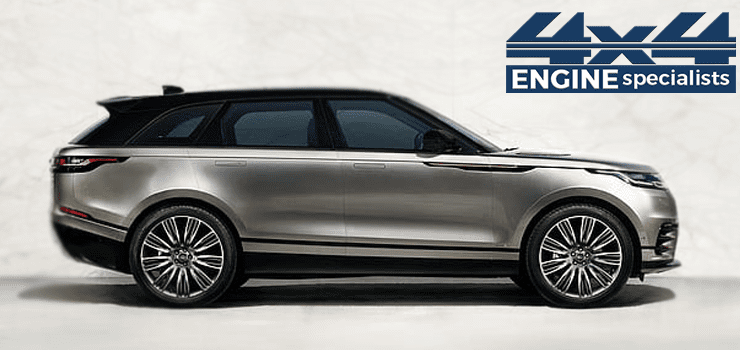Land Rover is a brand that has always been synonymous with innovation, performance and reliability. The company has been producing some of the most versatile and capable vehicles in the world for over seven decades. But what does the future hold for the Land Rover sport engine? How will it adapt to the changing needs and expectations of the customers and the environment? In this article, we will explore some of the trends and innovations that are shaping the Land Rover sport engine of tomorrow.
Hybrid and Electric Technology
One of the most significant trends in the automotive industry is the shift towards hybrid and electric technology. This is driven by the increasing demand for more fuel-efficient, eco-friendly and cost-effective vehicles. Land Rover is not lagging behind in this area. The company has already introduced several models that feature hybrid and electric technology, such as the Range Rover Sport PHEV, the Range Rover Evoque PHEV and the Defender P400e. These models combine a petrol engine with an electric motor and a battery pack, offering improved performance, lower emissions and enhanced driving modes. Land Rover is also working on developing fully electric vehicles, such as the Range Rover Sport EV, which is expected to debut in 2024.
Mild Hybrid Technology
Another trend that is influencing the Land Rover sport engine is the mild hybrid technology. This is a system that uses a small electric motor to assist the combustion engine during acceleration, braking and coasting. The electric motor recovers energy that would otherwise be wasted and stores it in a 48-volt battery. This energy can then be used to boost the engine power, reduce fuel consumption and lower CO2 emissions. Land Rover has already implemented this technology in some of its models, such as the Range Rover Sport MHEV, the Discovery Sport MHEV and the Defender MHEV.
Ingenium Engine Family
The Ingenium engine family is a range of modular engines that are designed and manufactured by Land Rover. The Ingenium engines are lightweight, compact and efficient, offering high performance, low friction and reduced noise and vibration. The Ingenium engines are available in various configurations, such as four-cylinder, six-cylinder and V8 petrol and diesel engines. The Ingenium engines also feature advanced technologies, such as turbocharging, direct injection, variable valve timing and intelligent stop-start system. The Ingenium engines power most of the Land Rover models, such as the Range Rover Sport, the Discovery, the Velar and the Evoque.
SVR Engine
The SVR engine is a special variant of the Ingenium V8 petrol engine that is developed by Land Rover’s Special Vehicle Operations (SVO) division. The SVR engine is tuned to deliver exceptional performance, responsiveness and sound. The SVR engine produces 575 PS of power and 700 Nm of torque, enabling the Range Rover Sport SVR to accelerate from 0 to 100 km/h in 4.5 seconds and reach a top speed of 283 km/h. The SVR engine also features an active exhaust system that enhances the engine sound and a dynamic mode that optimizes the throttle response, gear shifts and suspension settings.
Diesel Technology
Despite the growing popularity of hybrid and electric technology, diesel technology still plays an important role in the Land Rover sport engine portfolio. Diesel engines offer high torque, low fuel consumption and long range, making them ideal for off-road driving and towing. Land Rover has invested in improving its diesel technology, making it cleaner, quieter and more efficient. The company has introduced several models that feature diesel technology, such as the Range Rover Sport SDV6, the Discovery SDV6 and the Defender D240.
Plug-in Hybrid Technology
Plug-in hybrid technology is another innovation that is shaping the Land Rover sport engine of the future. Plug-in hybrid technology is similar to hybrid technology, but with a larger battery capacity that can be charged from an external source. This allows the vehicle to run on electric power alone for longer distances, reducing fuel consumption and emissions even further. Land Rover has already launched several models that feature plug-in hybrid technology, such as the Range Rover Sport P400e, which can travel up to 51 km on electric power only.
Hydrogen Fuel Cell Technology
Hydrogen fuel cell technology is one of the most promising technologies for the future of mobility. Hydrogen fuel cell technology uses hydrogen gas as a fuel source to generate electricity through a chemical reaction with oxygen. The only by-product of this process is water vapour, making it zero-emission and environmentally friendly. Hydrogen fuel cell technology also offers high performance, long range and fast refuelling times. Land Rover is currently exploring this technology as part of its Project Zeus initiative, which aims to develop a hydrogen fuel cell prototype based on the Defender model.
Autonomous Driving Technology
Autonomous driving technology is another trend that is transforming the automotive industry and the Land Rover sport engine. Autonomous driving technology refers to the ability of a vehicle to drive itself without human intervention, using sensors, cameras, radars and artificial intelligence. Autonomous driving technology can offer many benefits, such as improved safety, convenience and efficiency. Land Rover is already developing and testing its autonomous driving technology, such as the Range Rover Sport Autobiography, which can navigate complex urban scenarios and park itself.
FAQs
What is the difference between hybrid and electric technology?
Hybrid technology combines a petrol or diesel engine with an electric motor and a battery pack, while electric technology uses only an electric motor and a battery pack.
What are the advantages of mild hybrid technology?
Mild hybrid technology can improve the engine performance, reduce the fuel consumption and lower the CO2 emissions.
What are the features of the Ingenium engine family?
The Ingenium engine family is a range of modular engines that are lightweight, compact and efficient, offering high performance, low friction and reduced noise and vibration.
What is the SVR engine?
The SVR engine is a special variant of the Ingenium V8 petrol engine that is tuned to deliver exceptional performance, responsiveness and sound.
Why is diesel technology still relevant?
Diesel technology still offers high torque, low fuel consumption and long range, making it ideal for off-road driving and towing.
How does plug-in hybrid technology work?
Plug-in hybrid technology is similar to hybrid technology, but with a larger battery capacity that can be charged from an external source. This allows the vehicle to run on electric power alone for longer distances.
What is hydrogen fuel cell technology?
Hydrogen fuel cell technology uses hydrogen gas as a fuel source to generate electricity through a chemical reaction with oxygen. The only by-product of this process is water vapour.
What is autonomous driving technology?
Autonomous driving technology refers to the ability of a vehicle to drive itself without human intervention, using sensors, cameras, radars and artificial intelligence.


